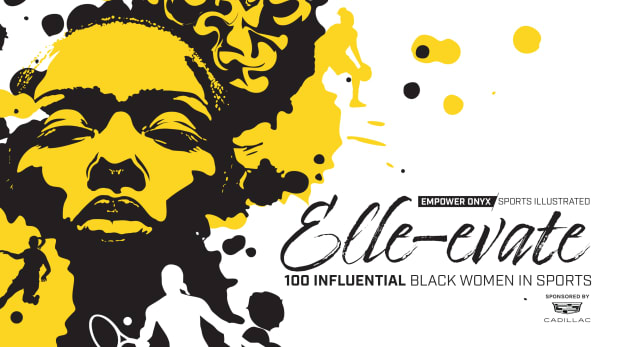As VP of partner services, Scott represents thousands of players and their individual rights, and helped pass the NFLPA’s historic commercial agreement.

Courtesy of Kevin Koski
Sports Illustrated and Empower Onyx are putting the spotlight on the diverse journeys of Black women across sports—from the veteran athletes, to up-and-coming stars, coaches, executives and more—in the series, Elle-evate: 100 Influential Black Women in Sports.
Gina Scott is more than accustomed to representing thousands of players and their individual rights, and working to preserve their autonomy and best interests. As the vice president of partner services for the NFL Players Association, she was the only woman in the room throughout its commercial agreement, which took nearly two years to negotiate. The agreement was the lesser-known but equally important partner to the infamous collective bargaining agreement, and went into effect just days before the pandemic began, ensuring that players’ abilities to generate income and create individual revenue were protected. Now 13 years into her career in the NFLPA, the industry veteran reflects on what it’s meant to represent a predominately Black league, and to be a conduit for education and access when it comes to protecting the rights of more than 2,000 players.
A southerner at heart, Scott grew up in Jacksonville, also spending time in Georgia and Louisiana before making her way to D.C., where she currently resides. Though she didn’t come up playing traditional sports, she found herself on a competitive cheerleading squad at her tiny prep school, foreshadowing her future career of empowering athletes. “After high school I stayed in state, went to the University of Florida,” she says. “And if you know anything about the South, we love our football. So I went from a graduating class of 113, to a university of 35,000—from that, 2,000 of us were students of color. That was really the start of a new chapter. Not only going to a school that could expose you to any and everything, with so many resources, but also being a part of a very small minority community.”
Shortly after graduating with an advertising degree, Scott began pursuing her graduate degree in sports management, unaware that she was setting the course for the rest of her professional path. She found herself in a coveted role at the intersection of athletics and advertising, her entry into the executive side of the industry. “That would be the first position of what was my beginning to a very long career in sports,” Scott says. “I didn’t know it then, but I know it now. There wasn’t a lot of Black people on the administrative, and what we call the front-office side of sports. I was actually the first University of Florida student that was in that coveted graduate assistantship position. You never know when you're breaking barriers until after you’ve already broken through the door.”
After securing positions with LSU athletics, and eventually the Atlanta Hawks, Scott began to understand how unique her perspective was, and how she could leverage that lived experience to her advantage, rather than just play nice or try to blend in. “It became very apparent that you didn’t see very many women working in the front office of sports,” Scott says. “I started knowing at a very early age in my career that this was going to be something really special. I was in a position where I would not see a lot of people that look like me. I’m treading new waters here and I just got to represent for everyone that’s not even in this place yet.”
Scott leveraged her ability to stand out in the industry to put herself into an even more unique position—working as a woman on the revenue side of the business. She notes the gender-specific roles that are expected in the space, and how these roles are frustratingly tied directly to pay gaps for women. “In our business, most men work in revenue-generating positions,” she explains. “And that’s not just a football thing, that’s a sports thing. What you’re going to find is most men will work in positions that are directly tied to the money. They’re going to be your CFO, in accounting positions, the head of sales, the chief marketing officers. When it comes to women, we work in what I would say the more empathetic position. Client service, community relations … it’s so gender specific.”
According to Scott, that’s exactly why sports fans need to retain a laser-sharp focus on women breaking into high-paying positions typically held by their male counterparts. That visibility creates pressure, and when progress occurs the effect is felt across sports. “I don't care if she’s a majority or minority owner for an NFLPA or an NBA team, it is to be celebrated when you have a woman who is in a presidential role of any sports franchise.”
As one of the only Black women in these rooms, Scott has no interest in gatekeeping access to higher-stakes roles, especially across the NFL. “I really use that to my advantage,” she says. “I decided early on that I was going to basically make a path for other women in a field that was traditionally occupied by men. That means, consequently, every time I made a call to an NFL club or an NFL sponsor, they remembered me, because it's not that many Black women coming in there, leading your partnerships team, and talking to you about money.”
Ultimately, Scott knows she has a job to do, and there’s a lot at stake—she’s in a powerful position to represent the interests of her players, and her voice is especially crucial for the Black men who make up the majority of the league. “I have got the weight of 2,000 NFL players on my shoulders,” she says. “These players are my family. I don't know if I'm sister, auntie, cousin, but I use those relationships to my advantage, and I love the fact that most of our players are Black. Why? Because when they see me walking in a room, they know someone that looks like them is representing them on their behalf. That is probably one of the biggest joys of my 13-year career at the NFLPA.”
For Scott, it’s especially gratifying to uplift athletes coming into the league straight out of school, and helping them to parse through a million voices trying to influence—and often take advantage of—them. To empower the players around her, it’s become her goal to connect directly with them and their families, and explain the nuances of the business. “You have to remember, for a lot of these players and their families, they are instant millionaires overnight,” Scott says. “When I’m at our events, be it the draft or Super Bowl or Pro Bowl, I start actually feeling like a magnet, like we’re instantly connected to each other. I take those relationships very seriously. I look at these players and their families as an extension of my family, and I hope that they feel the same way about me.”

Naya Samuel is a contributor for Empower Onyx, a diverse multi-channel platform celebrating the stories and transformative power of sports for Black women and girls.